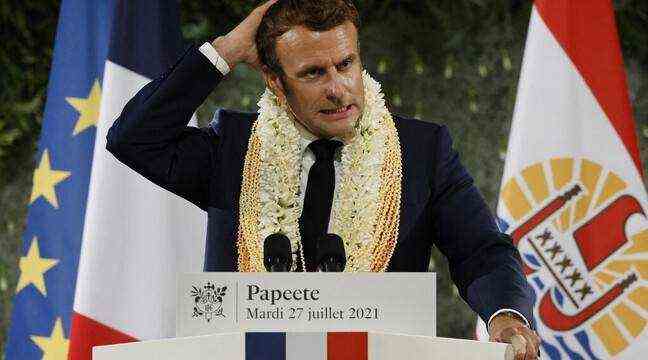The President of the Republic was expected at the turn: at the conclusion of his tour in French Polynesia, Emmanuel Macron gave a speech on Tuesday evening about the legacy of nuclear tests, in particular on the Mururoa atoll. 193 took place for thirty years, until 1996. Several reports have shown that these nuclear tests had consequences on the environment and therefore on the local populations and the soldiers who carried out these tests. A large number of cancers are notably attributed to radioactive fallout.
François Hollande had already set up a compensation system, his successor went a little further by acknowledging “a debt”, but without apologizing. With the historian Jean Garrigues, president of the Parliamentary and Political History Committee, 20 minutes sought to know what could change this discourse, concretely.
Emmanuel Macron recognizes a debt, what does that mean?
It is a word which is consistent with the policy of “repentance” which is rather the axis of Emmanuel Macron. There had already been his remark on crimes against humanity during colonization in Algeria. [pendant la campagne présidentielle de 2017]. We also remember the trip to the West Indies [en 2018]. It is a policy aimed at trying to heal a painful memory vis-à-vis overseas.
Because I think what Emmanuel Macron means by “debt” is that of colonization. A colonization which caused an exploitation of the indigenous populations and, in this case, a use of the maritime space for the nuclear tests. It is part of a policy rather focused on the recognition of the wrongs of the nation, which it is much criticized. Some would prefer the recognition of a more complex memory where one should also recognize the beneficial effects of colonization and not just this dark side.
How can that be translated in fact?
It is therefore a question of settling a debt, in a moral, financial and economic sense. There is necessarily a question of economic development: the metropolis will have to better promote Polynesian territories. There is an institutional question. Currently, French Polynesia is governed with a large degree of autonomy vis-à-vis Paris. It is an autonomy which seems to correspond to the aspirations of the Polynesians. It is undoubtedly necessary to involve the populations even more in the self-management of their territory. This is undoubtedly what the President of the Republic means. There can also be symbolic gestures, such as the recognition of Polynesian personalities neglected by official memory.
Emmanuel Macron does not ask for forgiveness, on the other hand, which is criticized by some of the local populations. Is it too early or is it impossible for a president to go on this ground?
I think if he asked for forgiveness, that would be criticized by many. It would mean that he has a totally negative outlook. This forgiveness would put the image and the word of the Republic, which it embodies, in a position of weakness. He obviously judged that this notion went beyond what is necessary to get closer to the indigenous populations. I think it is anyway a plan on which a President of the Republic can not go. He would express forgiveness on behalf of all French people. It would engage a collective responsibility that many French people are not ready to assume. It would go way too far. We would be here in a relationship to history that would be excessive in relation to the reality of the occupation of these territories. Finally, the concept of “debt” seeks to establish an equitable relationship, forgiveness would put France in a position of moral inferiority.

